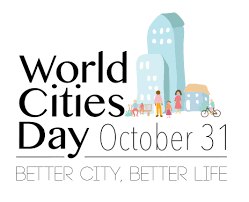
2020 Theme: Valuing Our Communities and Cities
The impact of COVID-19 has re-shaped urban life around the world. Local communities have played a key role in contributing to keeping people safe and maintaining some economic activities.
Community value encompasses local volunteering and people organizing in their own neighbourhoods as well as social movements that challenge poverty, systemic discrimination and racism. In informal settlements and slums in particular, communities are making a significant contribution while individual households in urban areas are providing an enabling environment for work and study in the home.
UN-Habitat’s latest World Cities Report reinforces the benefits of cities that engage all stakeholders, including local communities to foster sustainable cities. The Secretary-General has identified cities and communities as being on the frontline of the COVID-19 response. Collectively, we can truly foster sustainable cities for all.
Community activities can no longer be taken for granted or under-resourced. Policy makers and urban managers need to engage communities systematically and strategically in urban planning, implementation and monitoring to co-create the cities of the future.
The recognition of communities’ value must be maintained beyond the virus outbreak. In the transition to a new sustainable urban normality, local communities must play an expanded role supporting government stimulus packages for employment creation, delivery of essential services, ensuring a green-economic transformation, the provision of adequate shelter and public space and reestablishment of local value chains.
Background
Urbanization provides the potential for new forms of social inclusion, including greater equality, access to services and new opportunities, and engagement and mobilization that reflects the diversity of cities, countries and the globe. Yet too often this is not the shape of urban development. Inequality and exclusion abound, often at rates greater than the national average, at the expense of sustainable development that delivers for all.
Urban October was launched by UN-Habitat in 2014 to emphasize the world’s urban challenges and engage the international community towards the New Urban Agenda.
Sustainable Development Goal 11, which formulates the ambition to make cities and human settlements inclusive, safe, resilient and sustainable - underlying the relevance of UN-Habitat’s mission. Inequalities in cities have grown since 1980. The world largest cities are also often the most unequal, and this year’s theme is embraced by the action and implementation of the New Urban Agenda, which is putting the topic of inclusive cities as one of the main pillars for the urban shift.
In October 2016, the HABITAT III Conference, held in Quito, adopted a new framework, which will set the world on a course towards sustainable urban development by rethinking how cities are planned, managed and inhabited. The New Urban Agenda will set the pace on how to deal with the challenges of urbanization in the next two decades, and is seen as an extension of the 2030 Agenda for Sustainable Development, agreed on by the 193 Member States of the UN in September 2015.
Documents
- UN General Assembly resolution establishing World Cities Day (A/RES/68/239)
- World Cities Day 2020: Concept Note, Key Messages
- The New Urban Agenda (Habitat III)
- Report of the UN Conference on Human Settlements (HABITAT II, Istanbul, 3-14 June 1996, A/CONF.165/14)
- Implementation of the outcome of the UN Conference on Human Settlements (Habitat II) and strengthening of the UN Human Settlements Programme (Report of the Secretary-General, A/64/260)
- The World’s Cities in 2018 - data booklet










Add new comment